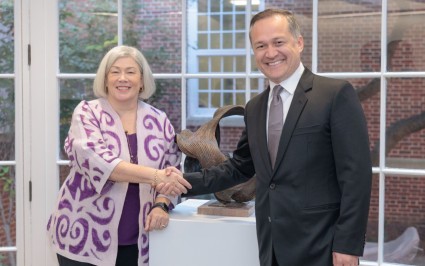American entrepreneur and philanthropist Bill Gates once said, “Never before in history has innovation offered promise of so much to so many in so short a time.” This year, the World Intellectual Property Organization is celebrating the 20th World Intellectual Property Day with the theme, “Innovation for a Green Future.” This year’s theme will look at the economic value of environmentally sound solutions, and the importance of respect for patents and design to create new technologies for a more sustainable future for us all.
Intellectual property rights take several forms, including patents, design rights, trademarks, geographical indications, plant breeding rights, and copyrights. All play a crucial role in spurring creativity and innovation in the arts, literature, research, business, and technology. Effective protection of intellectual property rights encourages creation by giving innovators confidence that their work will be safe from illegal copying and theft. Intellectual property protections also provide a framework for innovators to share ideas legally and generate even more solutions to shared challenges. In short, if we want our societies to move forward, we have to ensure that creators and innovators can profit from their creations and innovations!
“Innovation for a Green Future” offers a chance to honor those working to protect our planet through sustainable solutions, people like Uzbekistan’s Minister of Innovative Development, Ibrokhim Abdurakhmanov. Minister Abdurakhmanov and his team at the Center for Genomics and Bioinformatics developed technology for growing drought-resistant cotton that has been patented in five countries and with the World Intellectual Property Organization (WIPO). This technological advance will help provide sustainable cotton in the face of climate change and decreasing water resources, which is vital for Uzbekistan’s economy.
Entrepreneurs and innovators in the medical field also depend on intellectual property rights. Drug and pharmaceutical companies spend more than $100 billion every year to develop new vaccines and medications to protect the global population and improve health and welfare. Many of these companies are developing new technologies to fight the COVID-19 pandemic. Launching a new brand or product requires years of investment, research, and testing.
At the U.S. Embassy, we seek opportunities to share American industry and ingenuity through mutually beneficial partnerships with entrepreneurs, businesses, and research institutions in Uzbekistan. We are committed to opening markets, promoting trade, encouraging innovation, and creating jobs. American businesses like John Deere and Silverleafe Capital are bringing innovative technologies to Uzbekistan to increase sustainable agricultural productivity. SkyPower and GE Renewable Energy are developing green sources of energy to power the future of the Uzbek economy. These advances would not be possible without strong intellectual property rights to protect innovators and spur creation.
To put it in perspective, let’s look at the numbers. Intellectual property rights directly and indirectly support hundreds of millions of jobs around the world. A University College London study in 2016 found that green industries in the United States provide nearly 9.5 million jobs. This study also showed that the U.S. green economy generates $1.3 trillion in revenue per year, which is about 7 percent of our gross domestic product. With a solid intellectual property framework and enforcement regime, Uzbekistan could also reap the benefits of green innovation, both for the economy and for the well-being of future generations.
A business environment that safeguards ideas and creations will encourage entrepreneurs, attract international investment, and open new opportunities for exchange of technologies. The United States recognizes that innovation and creativity are critical for building a sustainable future, and we are committed to supporting the innovators and creators who are pushing the boundaries every day to find new solutions that will help preserve the planet for our children and grandchildren.
Daniel Rosenblum, U.S. Ambassador to Uzbekistan














